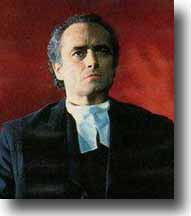Stiffelio
Royal Opera House Covent Garden, January 1993

By Rodney Milnes, Opera, March 1993
Carreras triumphs in "new" Verdi
Lost operas, forgotten operas, problem operas, when they are found, revived and have their creases ironed out, it sometimes happens that the reasons for their neglect become all too apparent. Not so with Stiffelio : at the first professional performance in this country at Covent Garden on Monday it was as though, through some weird 150 year time-slip,one were attending a major Verdi premiere. It is an astonishing opera, unlike anything else in the canon - Traviata is the nearest - and pole-axing in its depth of feeling and dramatic impact.
Yet the very strenght of the performance clarified the reasons for its failure in 1850. The setting was contemporary, which was unusual in serious opera. Stiffelio, the protagonist, is a fundamentalist Protestant pastor whose wife Lina is "an innocent" adulteress (she has been tricked into sin). The opera ends with Stiffelio forgiving her in public at a church service, reading from the Gospel about Christ and the woman taken in adultery : "He that is without sin among you, let him first cast a stone at her".
The score is suffused with love and compassion for the erring wife, and it can be no coincidence that during the period of composition Verdi had, to the outrage of the good citizens of Busseto, set up house with Giuseppina Strepponi, to whom he was not yet married and whose past was no better than it should be. Polite society's treatment of Giuseppina also informs the anger, three years later, of Traviata. Yet Stiffelio seems an even more personal work.
Italian audiences did not know what to make of a married priest, let alone a cuckolded and a forgiving one; They must have been as muddled as we are, momentarily, when Lina demands that Stiffelio hear her confession as a Protestant pastor (eh ?) , not as a husband. And it has to be said that, after a trumpet tune in the overture that is pure Salvation Army, the music does not exactly sound nonconformist : much of it dances in Mediterranean sunshine, and the rawness and immediacy of the emotions expressed are not those one immediately associates with people from north of the Alps (the original setting was Salzburg).
In any event, by the time the censors had reduced Piave's libretto to nonsense, the opera had little chance of success. Verdi rewrote it as the conventional historical drama Aroldo and mutilated the Stiffelio autograph in the process ; the original only started to be reconstructed in the 1960s, and Edward Downes's performing edition unveiled on Monday is as authentic as can be.
The rawness and immediacy account for Stiffelio's impact. The marriage on the rocks is not Hispano-heroic or Italo-historical : it is plain bourgeois, and the scenes in which the hapless couple try to sort it out are almost too painful to witness. The opera comes immediately before Rigoletto, and points forward to mature Verdi far more than it looks back. For example, the Rigoletto quartet is often cited as a milestone in operatic history, with four people voicing conflicting emotions within a single musical structure ; the Stiffelio quartet for erring wife, the husband who has just discovered her guilt, the correspondent, and the wife's oversolicitous father expresses even more conflicting emotions and is, frankly much more interesting musically. And two outstanding soprano arias, an archetypal Verdian father-daughter duet and a stunning concertato in the first-act finale, and you have a score of bewildering richness.
Monday's performance was beyond any but nit-picking criticism. Downes's conducting confirmed him as one of the (and not the) world's leading Verdians, grandeur, sweep, energy, allied to extraordinary delicacy. Elijah Moshinsky's production spared us nothing in rawness and immediacy, and indeed dramatic truth , and Michael Yeargan's mid 19th-century, middle-American settings with the beautifully observed Victorian costumes by Peter J.Hall were all gain.
It is possible to imagine a Stiffelio with more light and shade, more nuance than Jose Carreras's, but of his heroic stature, his instinctive command of a role that looks forward to Otello in its demand there can be no doubt. Catherine Malfitano's generously, radiantly sung Lina was a glorious assumption, and the increasingly valuable Gregory Yurisich has done nothing better than his proud, ravaged, eventually homicidal father-figure. Robin Leggate and Gwynne Howell gave valiant support.
This Stiffelio is a great event : move mountains to see it.
This page was last updated on: May 17, 2005